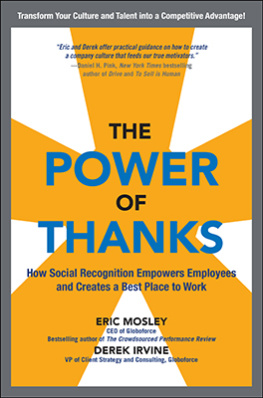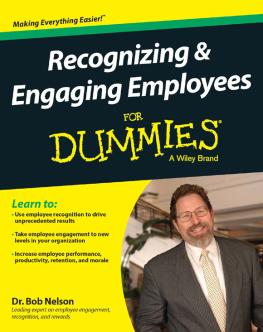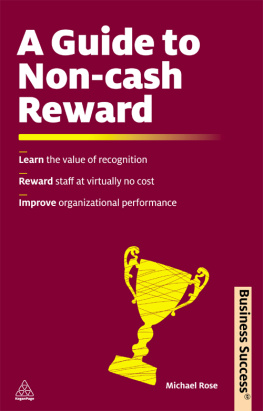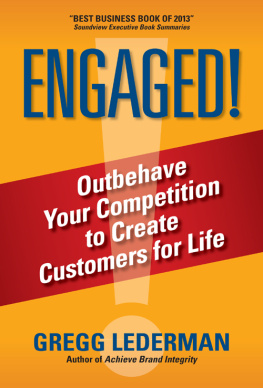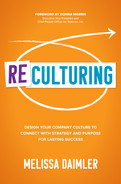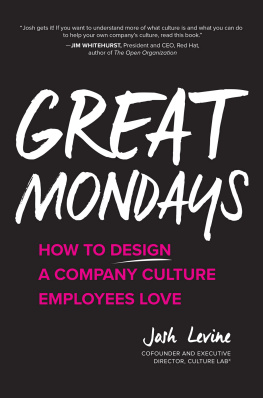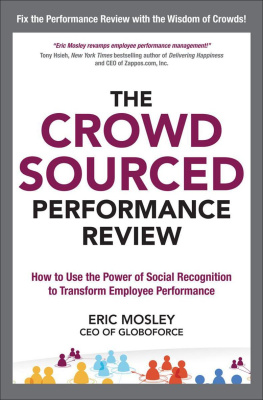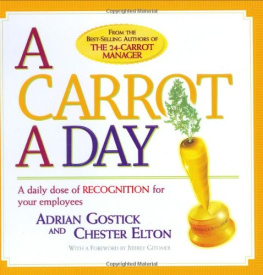Praise for The Power of Thanks
The best endorsement for The Power of Thanks is simple thanks. Thanks for a well written, insightful, useful, and timely book on how leaders can create abundant cultures that deliver employee and company results.
Dave Ulrich, Rensis Likert Collegiate Professor of Business Administration, University of Michigan; Partner the RBL Group
Thank you, Eric Mosley and Derek Irvine for providing practitioners with both the practical and empirical value of appreciation in your book, The Power of Thanks. Through their mix of case studies, anecdotes, and examples, they underscore the role of social recognition in building culture and driving sustainable business performance. Given that by definition appreciation is an ability to understand the worth, quality, or importance of something, Eric and Derek have contributed immeasurably to the appreciation of the importance of others use of a simple, but significant phrase: Thank you.
Mark Berry, Vice President of People Insights, ConAgra Foods
A very readable, practical and engaging primer on building a culture of recognition. Indispensable for the practising HR leader.
Hayagreeva Rao, Atholl McBean Professor of Organizational Behavior, Graduate School of Business, Stanford University
All people, in all levels, will benefit from reading this book. It is a reminder that gratitude in the workplace is a critical driver for success for businesses large and small. Not only does it boost employee morale, it fuels higher levels of performance by making your culture a great one.
Rieva Lesonsky, CEO of GrowBiz Media and former Editorial Director of Entrepreneur Magazine
This book is the equivalent of getting tutored by a world-class corporate culture coach. Its clear, concise, and often eye-opening insight is a road map toward a happier and more productive workforce.
John Hollon, Vice President of Editorial, TLNT.com, and the former Editor of Workforce Management magazine
The simple act of saying thank you, and doing it often, is a brilliant way to bring humanity into the work experience. This book provides tangible and simple ways to make gratitude a priority when interacting with colleagues, creating work environments that are richer, more productive and frankly more fun.
Tim Leberecht, author of The Business Romantic and CMO of NBBJ
The Power of Thanks is a compelling book that makes a convincing argument that recognition and appreciation are the key ingredients required for an amazing high performance culture. With a mix of research, a proven system, and numerous case studies, Eric Mosley and Derek Irvine provide the blueprint for creating a culture of appreciation, which in turn drives higher levels of commitment, performance and loyalty.
Kevin Kruse, New York Times best-selling author, We
Eric and Derek shine an important new light on the value of appreciation in the workplace. Their insights on the effect a simple moment of recognition can have on individuals, teams and overall culture changes the game for HR leaders.
Daniel H. Pink, New York Times bestselling author of To Sell is Human and Drive
At work, nothing matters more than being valued and appreciated. By providing a natural way for people to give and receive recognition, the strategies outlined in this book can help HR leaders drive higher levels of engagement and performance.
Adam Grant, Wharton professor and New York Times bestselling author of Give and Take
The principles in this book have redefined how Hersheys employees interact across the globe every day. There is immense power in a thank you and well done. Social recognition is not a nice-to-haveit is part of a winning, vibrant culture that will help deliver sustainable performance and outstanding results.
Kevin Walling, SVP, Chief Human Resources Officer, The Hershey Company
Perfect guide for business leaders in positively tapping the talents of their associates, especially during stressful, turbulent times.
Steve Forbes, chairman and editor-in-chief of Forbes Media and bestselling author of Money
The Power of Thanks isnt just a book. Its a greater movement driven by social recognition to show your people how truly important they are to the mission of a company. Its helped us lift our crewmembers to higher levels of performance and engagement by recognizing the most important pieces of our culture: our values and people.
Michael Elliott, SVP of People, JetBlue Airways
Recognition is something we all crave on the inside. When its done effectively, in the ways Eric and Derek articulate, it resonates on the outside, driving positive change and moving organizations to enviable levels of success.
Marshall Goldsmith, author of the New York Times bestseller What Got You Here Wont Get You There
Copyright 2014 by Globoforce Limited. All rights reserved. Except as permitted under the United States Copyright Act of 1976, no part of this publication may be reproduced or distributed in any form or by any means, or stored in a database or retrieval system, without the prior written permission of the publisher.
ISBN: 978-0-07-183841-2
MHID: 0-07-183841-4
The material in this eBook also appears in the print version of this title: ISBN: 978-0-07-183840-5, MHID: 0-07-183840-6.
eBook conversion by codeMantra
Version 1.0
All trademarks are trademarks of their respective owners. Rather than put a trademark symbol after every occurrence of a trademarked name, we use names in an editorial fashion only, and to the benefit of the trademark owner, with no intention of infringement of the trademark. Where such designations appear in this book, they have been printed with initial caps.
McGraw-Hill Education eBooks are available at special quantity discounts to use as premiums and sales promotions or for use in corporate training programs. To contact a representative, please visit the Contact Us page at www.mhprofessional.com.
TERMS OF USE
This is a copyrighted work and McGraw-Hill Education and its licensors reserve all rights in and to the work. Use of this work is subject to these terms. Except as permitted under the Copyright Act of 1976 and the right to store and retrieve one copy of the work, you may not decompile, disassemble, reverse engineer, reproduce, modify, create derivative works based upon, transmit, distribute, disseminate, sell, publish or sublicense the work or any part of it without McGraw-Hill Educations prior consent. You may use the work for your own noncommercial and personal use; any other use of the work is strictly prohibited. Your right to use the work may be terminated if you fail to comply with these terms.
THE WORK IS PROVIDED AS IS. McGRAW-HILL EDUCATION AND ITS LICENSORS MAKE NO GUARANTEES OR WARRANTIES AS TO THE ACCURACY, ADEQUACY OR COMPLETENESS OF OR RESULTS TO BE OBTAINED FROM USING THE WORK, INCLUDING ANY INFORMATION THAT CAN BE ACCESSED THROUGH THE WORK VIA HYPERLINK OR OTHERWISE, AND EXPRESSLY DISCLAIM ANY WARRANTY, EXPRESS OR IMPLIED, INCLUDING BUT NOT LIMITED TO IMPLIED WARRANTIES OF MERCHANTABILITY OR FITNESS FOR A PARTICULAR PURPOSE. McGraw-Hill Education and its licensors do not warrant or guarantee that the functions contained in the work will meet your requirements or that its operation will be uninterrupted or error free. Neither McGraw-Hill Education nor its licensors shall be liable to you or anyone else for any inaccuracy, error or omission, regardless of cause, in the work or for any damages resulting therefrom. McGraw-Hill Education has no responsibility for the content of any information accessed through the work. Under no circumstances shall McGraw-Hill Education and/or its licensors be liable for any indirect, incidental, special, punitive, consequential or similar damages that result from the use of or inability to use the work, even if any of them has been advised of the possibility of such damages. This limitation of liability shall apply to any claim or cause whatsoever whether such claim or cause arises in contract, tort or otherwise.
Next page

